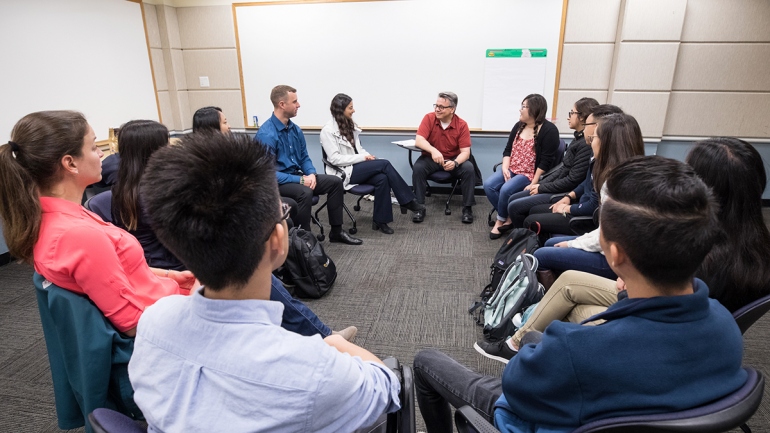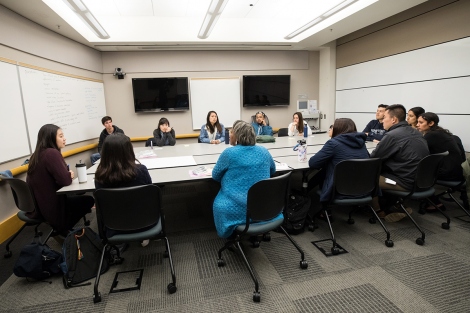New Inquiry-Based Curriculum Empowers Future Pharmacists to be Catalysts for Change

Members of the newest UC San Francisco doctor of pharmacy (PharmD) class didn’t have to wait long for their learning to become relevant and real: The first hour of the new pharmacy curriculum introduced students to a patient taking statins for cardiovascular disease and a host of medications to treat different types of pain.
“We got to witness an interaction between one of our professors and her patient, and see what pharmacists actually do. It was so helpful, putting into perspective what it means to be a pharmacist and why I’ve chosen to do a PharmD, so I can be a catalyst for change for my patients,” said first-year student Zachary Carlson.
“We did this on purpose,” explained School of Pharmacy Vice Dean Sharon Youmans, PharmD, MPH, leader of the School’s PharmD curriculum transformation project. “We wanted our students from day one to be asking why, how, what if – to start developing an inquiry habit of mind and put the patient front and center.”
Built on a foundation of scientific thinking, and one that exposes students to the latest questions in research and patient care, the new curriculum differentiates UCSF’s PharmD degree program from the growing number of programs nationwide.
“Our science is what makes us tick,” said Dean B. Joseph Guglielmo, PharmD. “While our curriculum has traditionally had a science base, tomorrow’s pharmacy leaders need both deep science knowledge and the skill to solve problems by thinking scientifically.”
UCSF’s PharmD program consistently rates among the top three pharmacy programs nationally, “but we’ve never rested on our laurels,” said Guglielmo. “Our curriculum has continually evolved. It has to, especially now in the face of a health care landscape that’s all about change.”
Answering Tomorrow’s Questions
The new curriculum will help students learn how to question, how to identify problems, how to gather information, how to pose and test solutions, and always with the patient first in mind, said Youmans.
“Health care is increasingly multifaceted, with new technologies, policy changes, and a daily avalanche of new research information about diseases, and disease treatment and prevention,” she said. “There’s too much information today for students to memorize everything as we did in years past.
“We need to prepare students to answer questions about pharmacy that don’t even exist today. Now, more than ever, we need practitioners who are nimble, and unfazed by complexity and uncertainty.”
The new curriculum is taught in the way pharmacy is practiced – through the lens of organ systems and disease categories.
“I was first drawn to UCSF because of its amazing reputation,” said Carlson, who was inspired to pursue a health sciences graduate degree because of the role practitioners and drugs played in curtailing his childhood epilepsy. “The new curriculum is really exciting, the way it’s organized into organ systems, so we’ll be synthesizing information together rather than learning related material separately. It feels like a more organic way to learn.”
“This is a truly integrated curriculum that does away with siloed courses,” Youmans said. “When you’re studying the cardiovascular system, for example, you’re learning the associated anatomy, physiology, chemistry, drug development, pharmacokinetics, health policy, pharmacy law. Students always ask ‘Why am I learning this? How is this relevant?’ This approach helps them connect the dots.
“We want students to get comfortable questioning the status quo, sharing opinions, even if they’re not sure they’re right,” Youmans said. “That’s how we learn, and that’s how we make cutting-edge breakthroughs.”
Asking questions, in the right way, is essential to learning in the new curriculum.
The new curriculum’s “inquiry” thread, which runs throughout the program, brings students together in small groups to evaluate and debate health sciences topics and hear from scientists – both at UCSF and in industry – about research and patient care frontiers and challenges.
Inquiry will equip students with the formal scientific thinking skills and tools they will need to continually identify and solve problems, said Francesca Aweeka, PharmD, faculty member in the school’s Department of Clinical Pharmacy and co-director of the inquiry thread of the curriculum. It will ultimately also ready students for their own team-based “Discovery Projects” which they’ll present to the faculty and their classmates at the end of the program, she added.
Building the Curriculum
The new curriculum came about, said Youmans, through a “tremendous team approach, leveraging faculty and staff expertise over the past five years” in the school’s three departments of bioengineering and therapeutic sciences, clinical pharmacy, and pharmaceutical chemistry.
“We’re always re-evaluating and innovating, and have been since we first accepted students in 1872,” Youmans said. “Our goal is to prepare fearless and compassionate leaders in pharmacy, with a scientific mindset and a limitless future.”

“Our students will experience the new curriculum in three ways: They’ll build their core knowledge, experience pharmacy practice, and explore new ideas and innovations in science and practice – all while they develop inquiry skills,” Youmans emphasized.
Other features of the new curriculum include the teaching of patient care skills, such as immunizations, in sync with the organ system and disease category topics students will be learning and the patient care experiences they’ll begin just weeks after classes begin. Students will learn in small groups and, as much as possible, together with other UCSF health professional students.
The new curriculum is offered over three years, year-round instead of over four years with summer vacations. “We’re going to get students quicker to a degree and equip them with the skills and mindset to go anywhere, do anything. In fact, post-PharmD training is encouraged, explained Youmans. “Most of our students go on post-graduate pharmacy residencies. We encourage this as well MPH programs, PhD programs, MS programs, research fellowships.”
Our goal is to prepare fearless and compassionate leaders in pharmacy, with a scientific mindset and a limitless future.
UCSF School of Pharmacy Vice Dean
The new curriculum is going to be “a game changer” in terms of how other schools look at pharmacy curricula, Youmans predicted.
“At the same time, current students who entered our program in 2017 and before are also excelling under a more traditional curriculum while also helping us plan the new program. Their input has been indispensable,” explained Guglielmo. “That’s exceptional and speaks to their commitment to the profession and their support of change.”
With 96 students, this year’s 2018 incoming class is smaller than the usual 122 to 127. “We did that intentionally to be nimble and in continuous quality-improvement mode,” Guglielmo said. The new students are excited by the new curriculum, Guglielmo said. “Many said it was the reason UCSF was their first choice.”
Carlson was impressed that the school started seeking feedback from students before classes started: “It’s a new frontier, and it’s exciting to be part of that and help shape the program.”
What Guglielmo most appreciates about the new curriculum is that, from day one students “experience the responsibility of making sure that patients are on the safest, most effective drugs,” he said. “Coupled with integrated coursework and how to think clinically about disease states, to my knowledge there’s no other PharmD curriculum like this in the world.”